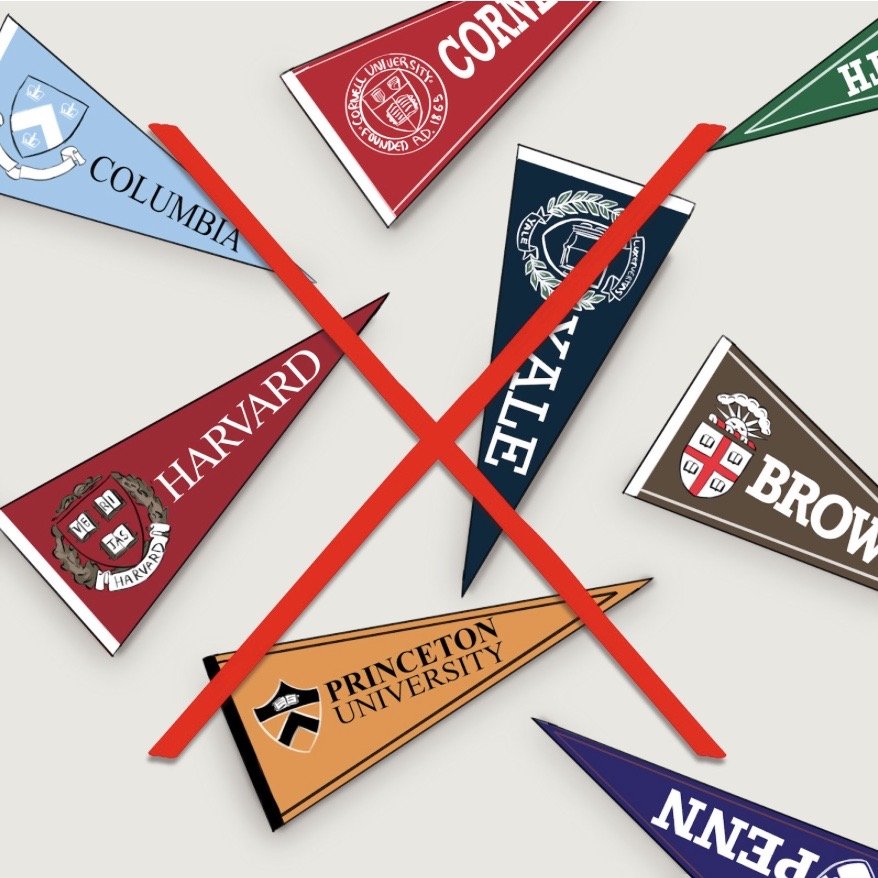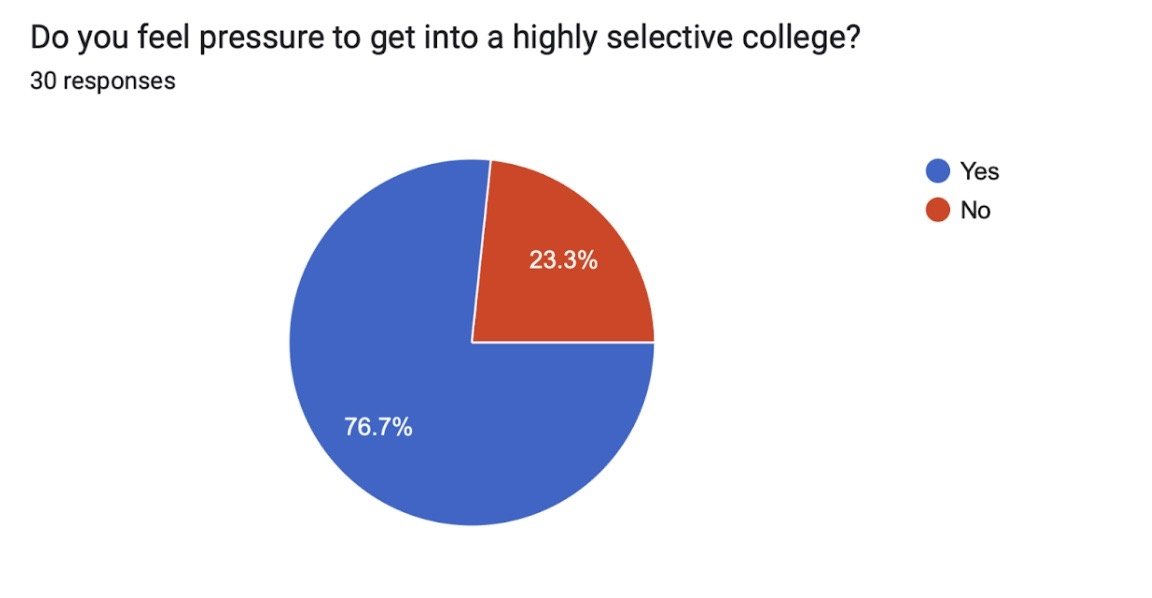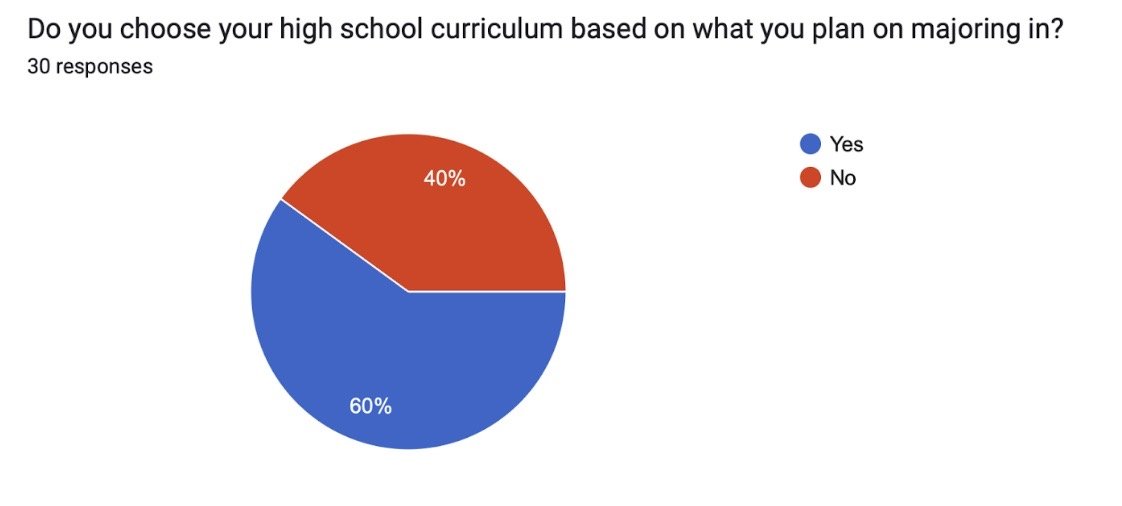OPINION: Why you shouldn’t care about getting into an elite college
By Elise Kim ‘25
Graphic by Ila Reynolds-Kienbaum ‘27
Ivy League. Under 10% acceptance rate. Elite. Highly selective. Upon hearing those words, ears perk up, eyebrows raise, eyes widen in awe. Most anyone immediately congratulates the lucky acceptee with cheers and applause because surely that person will go on to be successful in whatever they do.
This is the age-old narrative students and parents alike have been told. That a highly selective school is equivalent to a golden one-way ticket to success, a prosperous future, and an overall happier life.
While this may be the case for a select group of students, we must understand that it is certainly not the case for all. Getting into an elite college should not be the end-all-be-all.
Anne, a former elite college admissions officer, stated that over the past 10 years, the admissions process has changed in one major way. Students on average are applying to more schools which dramatically increases the number of applicants at each school. She explained during her seven years working at her institution the number of applicants went from just over 30,000 to 60,000.
According to Anne, this sudden surge in applicants is the greatest contributing factor to a highly competitive admissions process, especially for selective schools. “Before you were competing for a certain number of spaces with 30,000 applications, and then now if you apply, you’d be competing for those exact same number of spaces with 60,000 applications,” said Anne. “And it’s 60,000 applications that are pretty well qualified. They look a lot like the first 30,000.”
In addition, most highly selective colleges, such as the Ivy League schools, now require students to write supplemental essays in addition to the Common Application. Anne stated that before “you wrote one essay. And now you might be writing 20 essays, in addition to that one essay if you’re applying to five or 10 schools…and each of those supplemental questions is different. It’s a lot of individual effort that you have put into each of those questions.”
Catlin Gabel School’s (CGS) Co-Directors of College Counseling, Blythe Butler and Joanna Frady, stated that inevitably students are going to feel stress especially when applying to highly selective colleges because of the “unpredictability of the outcome.”
“Anytime you are placing your fate in the hands of an unpredictable system or a system where it’s most predictable that the answer is going to be ‘No’, that’s very stressful,” said Butler. She explained this is especially the case when students tie their self-worth to their decision and use whether or not they get into X elite college as a way to validate all the work they’ve been doing.
This certainly seems to be the case at the CGS Upper School. In a survey conducted with a stratified sample group of 15 randomly selected Upper School students per grade, 76.7% feel pressured to get into a highly selective college.
Results from an anonymous survey with CGS students about college anxiety
According to most of the anonymous survey responses, most of this pressure comes from parents.
One anonymous responder stated, “My mom went to Columbia and my dad went to Stanford. Living up to their expectations is impossible. So, if I don’t go to an Ivy, it’s sort of a disgrace especially since I have been given more opportunities than my parents were given.”
CGS students also feel pressured simply because they go to a school like Catlin. One survey responder said, “Catlin is obviously a very prestigious and high-ranked school, and as someone who’s been here since Pre-K, it feels like the last 14 years of my life have been leading up to getting into a highly selective college. It’s just been ingrained into my head since I was 4 that college is the most important part of my life.”
Many CGS faculty members believe that there is too much emphasis on students to get into a highly selective college, which has caused an increase in student stress and anxiety.
While CGS Dean of Students John Harnetiaux understands that grades have an impact on selection, he worries when students catastrophize. According to Harnetiaux, often, students jump to conclusions, saying, “‘Oh, I got this grade on this thing. This is gonna mean I’m gonna get this grade in this class. When I get a grade in this class, it means that I’m not gonna get into this college. And if I don’t get into this college, I’m not going to have a successful life or be happy.’”
The worst of this stress seems to befall CGS seniors. Erin Gilmore, an Upper School counselor at CGS stated that seniors are so busy with college applications that they don’t even have time to come and talk to a counselor.
“A lot of stress I feel like is bottled up,” said Gilmore. “But I am hearing now this semester that there are students who would go home and just break down sobbing because they had so much to do.”
Worst of all, this pressure to get into a highly selective school inevitably fuels competitiveness and a culture of comparison throughout the student body.
According to senior Andrew Xu, “a fourth of the grade or, at the very least, a sixth of the grade” takes getting into a selective school extremely seriously and looks down on those applying to other “less prestigious schools”.
There have even been students who made a Google sheet with a list of where everyone had applied for Early Decision, stated DiLorenzo. DiLorenzo believes the list was made simply because people are “looking to feel more secure or confident about their own decisions.”
One survey responder stated, “People are very judgy at Catlin, especially of people who go to state schools like the University of Oregon or schools with above a 30% acceptance rate so it makes me feel like people will get an idea of me that I am not that smart…”
Another survey responder stated that “everyone else is competitive” about getting into “the best” college and so they feel like they should be too to “keep up” with their peers.
It’s not just the stress of applying to an elite college that is problematic, but the application process has altered the way students view high school as a whole. Now, because highly selective colleges are so hard to get into, students go through high school to make a highlight reel of stories to showcase to elite colleges in their college essays.
Often, students in high school are encouraged to specialize in one subject or one sport and become an expert because you’ll increase your chances of getting into an elite school. This was even stated in the junior college counseling meeting on January 24th, 2024.
In the survey of CGS students, the majority of respondents stated they choose their high school curriculum based on a potential future major.
Results from an anonymous survey with CGS students about college anxiety
At ages 15, 16, and 17, students should consider self-discovery or a time to try new things, but instead high school has become preparation for the college admissions process. “I think it happens at least one time to every student, at least at Catlin, where you’re like, ‘maybe it’d be cool to take this art class, but it would help me a lot more for college if I take this class,’ or ‘that class would probably look better on my transcript,’” said DiLorenzo.
Anne, the former admissions officer, agrees with this premise stating, “High school is for discovery and growth and exposure to ideas you haven’t had before, making friends, leadership experiences, maybe getting your first job and understanding how to work in a professional environment. High school is for so many things,” said Anne. “And those things may end up playing a role in your college application, but they’re not for your college.”
While going to an elite college can offer students advantages such as network opportunities, and learning alongside highly accomplished students, it doesn’t guarantee professional success. There are plenty of individuals who go to less selective colleges and still find professional success.
One must only examine the Fortune 500 List of 2023. It showed that only 11.8% of Fortune 100 CEOs obtained their undergraduate degree from Ivy League schools. Most notable within that list are Walmart CEO Doug McMillon who graduated from the University of Arkansas and Exxon CEO Darron Woods who graduated from Texas A&M University.
Warren Buffet, one of the best-known investors in the world, stated in a 2006 interview with the Wall Street Journal, “I don’t care where someone went to school, and that never caused me to hire anyone or buy a business.”
While we can all agree that there are tangible benefits to attending a highly selective school, it should not be considered the sole determinant of success for students. It most definitely should not be considered the norm or expectation for CGS students.
“There are more than 3000 colleges and universities in the United States and there’s certainly more than 10 or 15 schools where you can have a wonderful, beneficial, strong, positive experience,” stated Anne. “When we get fixated on that list of 10,15, 20 schools, it’s silly to think that those are the only schools where a student can get a lot out of them.”
Most importantly, it is important to recognize when the costs outweigh the supposed benefits. This is not just looking at the data, but more examining the effect it has had on student wellbeing.
Students come home sobbing, completely burnt out because they are overwhelmed with the sheer amount of work they must put in and the requirements that must be met to be considered “Ivy League material.” Students ask themselves “What do I need to do in order to appear the most attractive to an elite college?” instead of asking themselves, “What do I want to do with my life? What would make me happy?” Students live in a constant state of comparison, competing with their peers in a contest of who got into an Ivy and who wasn’t smart enough.
We must ask ourselves over and over: Is it all worth it?
For more information on this topic, check out these works:
Where You Go Is Not Who You’ll Be: An Antidote to the College Mania by Frank Bruni
Colleges That Change Lives by Loren Pope



